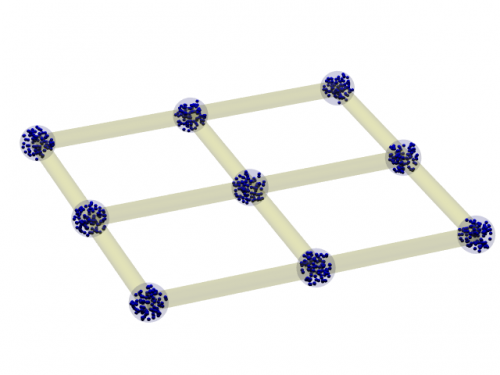Physicists develop method for quantum computers

Quantum computers can solve certain problems much faster than their classical counterparts, but their realization on a scale relevent for practical applications has proven to be very difficult. However, this could change with a new method for solid state quantum computers devised by physicists from Leibniz Universität Hannover, Germany, and Harvard University. The scientists around Dr. Hendrik Weimer from the Institute for Theoretical Physics at Leibniz Universität report their results in the journal Physical Review Letters.
While controlling single quantum bits ("qubits") is nowadays possible with high precision, the realization of large networks with many qubits remains an outstanding challenge. This is particularly relevant for devices based on magnetic impurities in solid state systems, where the magnetic interaction between the qubits is too weak. However, the research team could now show that this obstacle could be solved by grouping about 100 impurities to form a single collective qubit. When an external magnetic field is chosen correctly, the magnetic properties of the impurities lose their individual characteristics and become indistinguishable due to their quantum nature. Such collective quantum states are known to show drastically increased interaction strengths, allowing to perform faster quantum logic operations between the collective qubits.
While the proposed method is applicable for a large class of solid state qubits, the scientists present a detailed analysis for nitrogen-vacancy defect centers in diamond, demonstrating the realizability of much larger quantum networks. "As few as 50 collective qubits are enough for immediate applications in the simulation of strongly correlated quantum systems" Dr. Weimer explains.
More information: Hendrik Weimer, Norman Y. Yao, Mikhail D. Lukin. Collectively enhanced interactions in solid-state spin qubits, Physical Review Letters 110, 067601 (2013). dx.doi.org/10.1103/PhysRevLett.110.067601
Journal information: Physical Review Letters
Provided by Leibniz Universität Hannover



















